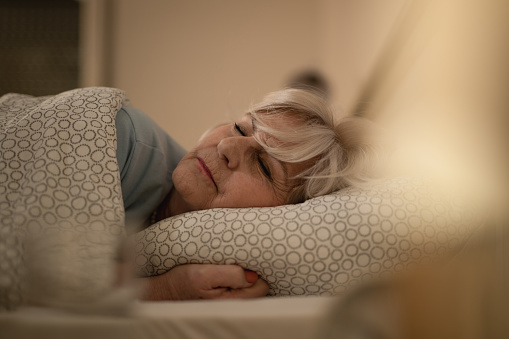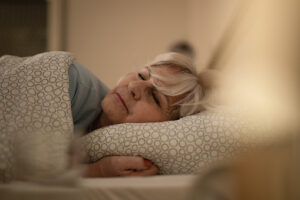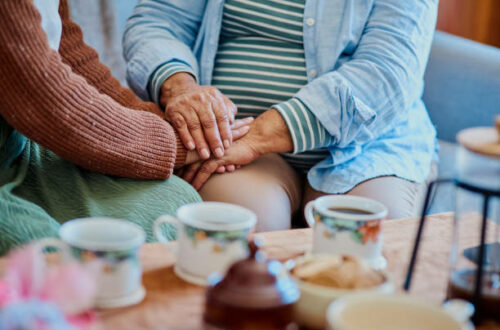
Improve the Quality of Your Life: Sleep
“Happiness consists of getting enough sleep. Just that, nothing more.” — Robert A. Heinlein
According to the 2020 U.S. census data, the oldest of the estimated 73 million Baby Boomers (born between 1946 and 1964) will hit 74 by the end of the year, and the youngest 56.
By the year 2030, all Boomers will be age 65 or older.
With time steamrolling ahead, what is one of the most significant quests for midlife adults today? Better health.
This article will focus on one area of health: sleep.

Why Sleep?
A German philosopher said that “sleep is to a man that winding up is to a clock.” It restores energy to the body, the brain, and the rest of the nervous system.
After a good night’s sleep, we awake in good spirits, eager to charge ahead, feeling much better and looking better.
Moreover, sleep gives us a break from life’s cares and tensions. In sleep, we rest our bodies and have rest from such burdens as poverty, loneliness, poor health, and injustices.
In 2020, we faced a worldwide health pandemic: COVID-19 that continues as of the date of this article.
Nowadays, life overflows with anxiety and stress!
Cervantes said centuries ago concerning sleep: “It is meat for the hungry, drinks for the thirsty, heat for the cold, and cold for the hot.”
Proper sleep is vital to our health and well-being.
What Kind of Sleep?
Sleep is a natural condition that occurs regularly and in which one loses awareness of one’s surroundings. Though it is a mystery as to what sleep is, the Oxford English Dictionary offers this definition:
“A state of rest in which the nervous system is inactive, the eyes are closed, the muscles relaxed, and the mind is unconscious.”
There are two kinds of sleep.
In one kind of sleep, which starts with drowsiness and gets deeper and deeper, profound restorative processes occur. Your breathing and heartbeat slow down, your blood pressure drops, and your limbs relax.
Experts believe this deep sleep is an aid to memory. It lasts for about ninety minutes.
Afterward, you return to sleep much lighter in some respects and other concerns, deeper. It is called the REM stage and is marked by the side-to-side Rapid Eye Movement, which indicates that you are dreaming.
Your heartbeat wildly fluctuates, and your limbs grow tense, indicating that your mind and body are involved in dreaming.
After about ten minutes of REM sleep, you will again go into a deep sleep for another ninety minutes and then back up, and so on throughout the night.
Most researchers believe that sleep is essential for mental and physical health; one cannot take the other’s place.
As to how long you sleep, quality is more than quantity.
However, with aging, sleep patterns tend to change.
Sleeplessness: A Common Complaint
If you have trouble sleeping, you have plenty of company, especially in industrialized countries like the United States, where sleeplessness or insomnia is most common.
And insomnia is one of the more common sleep problems in older people.
Sleeplessness usually takes one of three forms. Some have a lot of difficulty falling asleep in the first place. Others fall asleep readily but wake up early in the morning and cannot go back to sleep. With still others, the problem is that they keep waking up intermittently.
Most people find that aging causes them to have a more challenging time falling asleep. They awaken more often during the night and earlier in the morning.
Studies published in Science Daily (2018) show that “One in four Americans develop insomnia each year. About 25% experience acute insomnia, characterized by difficulty falling asleep or staying asleep for as little as three nights per week for at least two consecutive weeks up to three months.”
It also appears that women have more difficulty sleeping than men, by and large.
What Causes Insomnia?
One of a hundred different things can cause insomnia.
It could be inherited, a genetic defect in which the brain fails to produce serotonin, a hormone-like substance. This substance acts like a “sleep juice” that enters the blood and causes the body to become sleepy.
Your problem is possibly caused by some low-grade pain, ignored while you are busy during the day but persists enough at night to cause you to wake up from time to time.
Your trouble sleeping could be in a poorly ventilated room or because your mattress is too hard or soft.
Your trouble sleeping may be due to a stimulant such as coffee, tea, or a cola drink.
You may have had the habit of eating a heavy meal of food that is difficult to digest shortly before bed. Or, just the opposite, hunger may keep you awake, even as constipation at times interferes with sleep.
Negative emotions, such as feelings of guilt, excessive ambition, emotional insecurity, and especially anxiety or worries, may keep you from sleeping.
Mental depression can also cause insomnia and, in particular, can nervous exhaustion. Even though unconscious, the same can be said for hostile or aggressive feelings.
On the other hand, too much excitement or chasing after thrills can cheat you of sleep.
No matter what the underlying cause, you perhaps agree with this quote:
“The worst thing in the world is to try to sleep and not to.”—F. Scott Fitzgerald
How to Defeat Insomnia
Must you resort to pills to defeat insomnia?
No.
In Sleep Research, Dr. F.R. Freemon stated, “The promiscuous prescribing of sleep medications is the most common error in medicine.”
Taking sleeping pills may seem the most comfortable way out, but they can become addictive.
It would be best if you used them only in case of emergencies.
And older people respond differently to medicines than younger people. Thus, it is crucial to talk with a provider before taking sleep medicines; avoid them.
Try these basic ideas:
- Ensure your bedroom is well-ventilated and your mattress is comfortable (not too soft or too hard).
- Turn down the noise.
- Avoid drinking coffee or cola drinks after midday.
- Avoid eating a heavy meal or spicy foods shortly before bedtime.
- DO NOT take naps during the day.
- Take a walk or do some light stretching if you sit all day at work (nothing too strenuous as this will stimulate and keep you from sleeping).
- Learn to relax (meditation, restorative yoga, or reading).
- Practice deep breathing.
- Try a warm bath to help you relax.
- Use calming herbs and scents (lemon balm, passionflower, lavender, chamomile, valerian root).
- Play soothing music.
- Try to go to bed at the same time every night and wake up at the same time each morning.
- Have the right mental and emotional state (the worst thing you can do is worry when you can’t fall asleep).
(Source: A Family Caregiver’s Guide: 7 Secrets to Convert Negative Triggers to Positive Emotions)
I repeat, whatever you do, stop worrying. Worry only hampers your sleep. Usually, there is no danger in being without sleep for a period now and then.
The Swiss psychotherapist Paul Debois likens sleep to a dove. If you hold your hand gently, it comes voluntarily and settles on it. But if you try to grab it, it flies away.
How Much Sleep Do You Need?
It depends.
One study found that fewer than six hours make it harder for your brain to tune out distractions and focus.
Another article stated that some “short” sleepers (around four hours) had good sleep quality.
A research paper published in Sleep Health recommended the following ranges for sleep for healthy individuals and those not suffering from sleep disorders:
- Teenagers—eight to ten hours
- Adults and young adults—seven to nine hours
- Older adults—seven to eight hours (or slightly decrease to 6.5 to 7 hours per night)
Be aware that sleep is an ever-changing field. To learn more about sleep duration, visit:
https://www.sleephealthjournal.org
Here you will find a sleep duration recommendations chart.
Summary
Find the cause.
It is essential to find the real cause of your sleeping problem if indeed you have one.
Sleeplessness may be a symptom of some physical disorder, such as hypertension or an upset stomach.
But often, the cause is in your mind rather than in your body.
Are you worrying about something?
Try to reason it out with yourself in a balanced way.
Prayer and expressions of gratitude can put a person’s mind at ease.
Consulting a wise and mature friend regarding your problem may be beneficial.
Sound sleep might be considered a reward for the right living in many respects.
If you are a religious person, you undoubtedly agree with Solomon, who says of those exercising godly wisdom: “When you lie down, your sleep will be pleasant.” (Proverbs 3:24)
That godly wisdom would include producing the fruits of God’s spirit, such as “love, peace, long-suffering, kindness, goodness, faith, mildness, self-control,” all conducive to good sleep. (Galatians 5:22, 23).
So, if you are having trouble sleeping, do not become discouraged. There are several remedies or adjustments in your life that you might make to correct the problem.
If you suffer from sleeplessness, why not try the simple ideas found in this article? If they don’t work, see your doctor.
While it may be true that sleeplessness never killed anybody, it is equally valid that, as an exhausted victim of insomnia, said: “It can make you wish you were dead!”
Finally, if you are an older adult, you absolutely can improve the quality of your life right now.
How?
Sleep.
When it comes to your health and well-being in later years: “Sleep is the golden chain that ties health and our bodies together.”—Thomas Dekker
***** *****
Disclaimer: The content in this article is not intended as a substitute for medical advice. Talk to your doctor or healthcare provider before undertaking any therapy or treatment.




